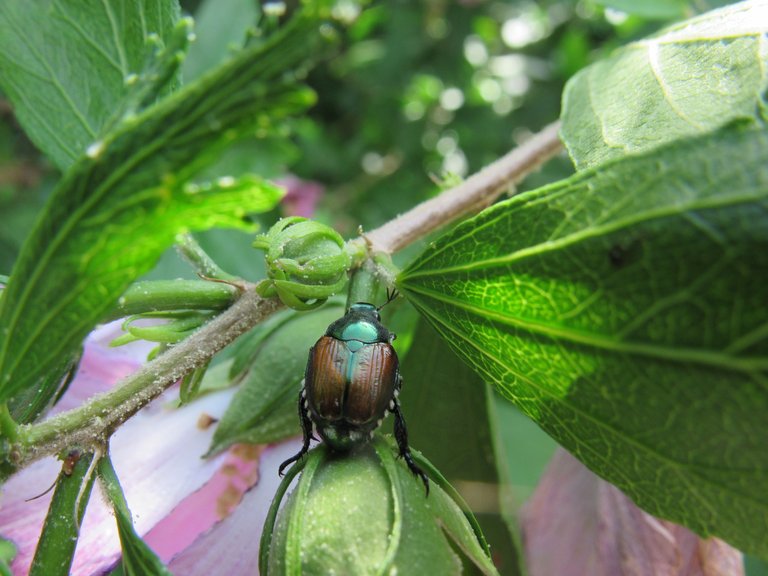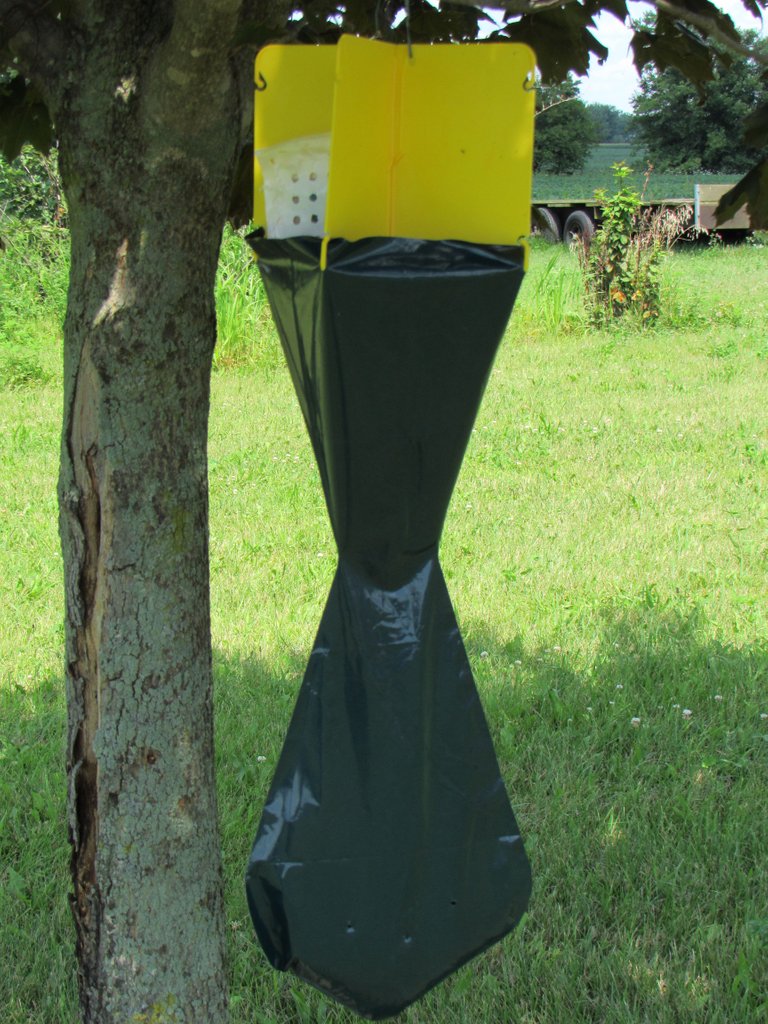I wrote a few days ago about how we were going to try our first attempt at reducing the Japanese beetle population in our orchard, vineyard, and garden. As I said before, we have become overrun with them and they are really starting to affect our fruit. We have had this trap out for a few days now and I would like to share what we found out.

I will first start off with the benefits. The trap did work and we did find there were some beetles inside of the traps. Also, we did notice that there was a reduction in that amount of beetles. So we are glad for that, but I have read that the beetles lay their offspring in the ground, and that the following year they could still cause problems. This means that if we put the trap out again for another year or two, then we should have the worst of the problem taken care of.
Now to some of the negatives of the trap. First off, some of the traps that we saw in action were just filled to the brim with beetles, but ours did not seem to fill up that fast. Now, this could be because those that we have talked to had a worse encounter with the beetles, but ours did not seem to collect them as fast and we have heard that it could actually attract more beetles to your property. The next negative is that it would require us to have several traps scattered around on our property because the affected areas are fairly spread out from each other. This can become costly to have to buy more lures every year, if the lure gets rained on, or having to purchase multiple sets of items. We like to use things that are sustainable and kept as organic as possible.

I do not want to take anything away from the fact that the trap did indeed work and did catch beetles. We will probably continue to use it for the rest of the summer, and for an additional year or two, to greatly minimize the problems, but I think I will keep trying to find some other ways to fix the problem. Like I said, I want to find a more sustainable and organic solution that will not become costly in the future. I have been told there are things one can put on the trees or even companion planting can be a remedy, so I think I will continue to look into those options.
Thanks for reading!
Can you place the traps at a location away from your affected areas? Try to draw the away rather towards the trees. I have not used these traps, but just a thought.... keep us posted on how it works, very interested!
Thank you for commenting! Yes, you are suppose to place the traps a little ways away from the affected areas while also making sure there is nothing in the path that the beetles will destroy. One could buy a stand, but we placed it in a tree that the beetles will not bother.
Those beetles look like a yikes thing to have. I'm rocking the beer in a mug against slugs in my "square meter garden" (it's actually aquaponics). Good luck trapping beetles. Are there no insect predators, maybe some wasps?
Thanks for your comment! I have heard about using beer to catch slugs with a lot of success. Luckily, we have not encountered slugs. I am not sure if there are natural predators, but I have been reading about some natural remedies you can put on trees or even companion planting.
What kind of fish are you using in your aquaponics system?
Trout
The reason I was asking is because I am very interested in aquaponics and I have been thinking about trying one on a small scale. Do you raise food to feed your fish (duckweed) or do you buy a certain type of fish food?
I buy a comercial pellet. Trout feed still relies on a bit of fish oil to make. There are other fish that can eat vegetarian.
We've tried the trap and skipping the trap and have noticed that when we have the trap, we draw more beetles to our little orchard for far longer than if we don't use the trap. It seems like the lure draws the beetles from miles around whereas if we skip the trap, we only deal with the ones right on our property.
This year we tried spraying the trees (especially the cherries) with a neem oil and sal suds mixture and it did seem to deter them, though we still had quite a crop that I was knocking into buckets of water to drown for about two weeks (not practical with a bigger orchard). I'm going to try putting milky spore into the soil of the orchard area this year and see if I can kill off the grubs actually in the area so we don't have quite so many beetles emerging right on top of our garden and orchard next year. And milky spore once established apparently stays in the soil for many years, so would be far more sustainable than the traps/lures.
We had heard about the traps drawing in beetles from outside our property. That was one reason why we were not real sure about the traps. I have heard about a lot of people using neem oil or milky spore, and they were options that we were considering this next year. We were still trying to do some research to figure out which option will work best. Do you have to reapply your neem oil mixture everytime after it rains?
I know some people reapply every time it rains and for that week or two when the beetles are worst I did diligently reapply (I also did earlier in the spring when the cherry trees got attacked by some type of black aphid which was destroying the new growth). I think I only had to do it twice for the beetle invasion, though. I learned you can put the mixture in a hose sprayer and set the dial, allowing you to do a lot of trees very quickly.
This was a really neat idea.. I have herd about covering fake fruit in glue and hanging them on your trees but washing them would be a pain.. And throwing them out costly! But sure beats the pants off walking around knocking them off into soap water!
Thanks! I have never heard about using fake fruit, but I am sure that it would get very costly. This was our first year were the beetle problem has been so bad, and we were relying heavily on what others in our area had recommended. Because like you said, the last thing we wanted to do was walk around knock them off into soapy water!